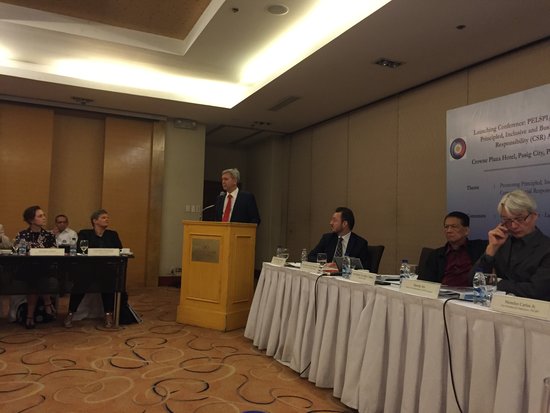PELSPI/LOFTF launches principled, inclusive and business sustainable CSR project
The Philippine Employer-Labor Social Partnership, Inc. (PELSPI) and the Danish Trade Union Council for International Development Cooperation (LO/FTF Council) launched a CSR advocacy project entitled “Principled, Inclusive and Business Sustainable CSR” during a one and half day conference on 1-2 December 2015 in Pasig City, the Philippines.
The conference aimed to demonstrate that the project which is focused on the working people as CSR beneficiaries and co-partners/implementers is not only feasible but redounds well to the corporation (higher productivity and better bottom lines), the working people (more jobs, higher welfare and sense of empowerment) and the larger community as a whole (socio-economic development and a sustainable community). The event featured representatives from the key sectors: business, government, civil society and trade unions.
In his welcome remarks, Sen. Wigberto “Ka Bobby” Tanada, PELSPI President, emphasized the need to “make CSR more meaningful for everyone”. Through this project, he hoped to raise CSR advocacy in the Philippines to a higher level, from merely philanthropy to joint projects for social partners. He was convinced that employers and workers can work together productively and sustainably if they respect each other’s rights and cooperate with one another in pushing for improved competitiveness for the business and decent work conditions for the workers.

H.E. Jan Top Christensen, the Danish Ambassador to Manila, giving the keynote address.
HE. Jan Top Christensen, the Danish Ambassador to Manila, delivered a keynote address. He said one of the key challenge for the Philippines is how to ensure sustainable development and lift up the living standards for its population of which 25 percent are still living below the poverty line. Companies, including SMEs, need to champion the adoption of CSR and live up to expectations. Some of the policies and actions companies should undertake include: respectful human resource policy and a decent working condition; clear and responsible environment policy; product safety; honesty in business transactions; commitment to and involvement in the local community; risk management to minimise harmful impacts on society, Ambassador Jan Top Christensen suggested.
The ASEAN CSR Network’s Project Coordinator Nguyen Thi Phuong Thao highlighted the significance of CSR in the national and regional development. She emphasized the changing landscape of CSR in ASEAN, particularly in the regional development agenda post-2015. She said CSR is no longer merely a socio-cultural issue but has been recognised by ASEAN leaders as a cross-cutting issue that needs cross-pillar collaboration, under the new ASEAN Community Blueprints 2016-2025. This represents an opportunity for greater multi-stakeholder dialogue and cooperation on CSR, and provides CSR advocates with a greater platform in pushing the adoption and implementation of the responsible business conduct. She noted that the tripartite framework as a multi-stakeholder social partnership has been the key strategy towards inclusive, equitable and sustainable socio-economic development, peace and security in Singapore.
A number of other resource speakers from Denmark, Indonesia and the Philippines who are from various industry sectors,m spoke about their respective organisations' and countries’ experiences in the development and implementation of rights-based and business sustainable CSR programmes.
At the end of the conference, participants discussed and adopted a PELSPI Declaration on Principled, Inclusive and Business Sustainable CSR Approach which reflects the commitment of PELSI and its member-organisations towards CSR as a tool to improve productivity and competitiveness, and ensure decent work; and a Process Action Plan outlining and describing action areas for joint labour-employer initiatives towards the promotion and enhancement of a principled, inclusive and business sustainable CSR approach in the Philippines.
